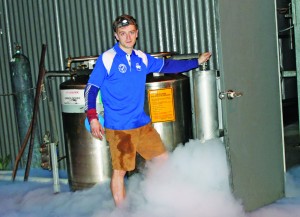Get the interview process right – Part 2
Tips to make sure you invest in the right candidate for your business
Source: Grapegrower & Winemaker, November 2014, Stephanie Timotheou
What does a candidate’s body language tell you?
Christian Campanella (CC), Pernod Ricard Winemakers’ global HR Director: Body language is an important part of the interview. It can say a lot about you. Used with the right language, you can make your message more powerful if it is combined with non-verbal communication. It is also important for the interviewer to remember that body language needs to be put into context. For example, someone from a Spanish background might act differently to someone from a French background, so this needs to be considered when evaluating the interview. Body language is most effective when you are being a true representation of yourself and push yourself in the right measure – there is no need to be an actor in an interview.
Lisa Morris (LM), Hays recruitment’s senior regional director for SA: It can indicate if they are nervous or confident.
How do you assess a candidate?
CC: There isn’t a ‘one size fits all’ solution. Having said that, there are internal procedures that Pernod Ricard Winemakers will go through to recruit for prospective candidates and ensure we bring the right people into the business. As part of this process, we will conduct interviews, personality testing, psychometric testing and sometimes add a creativity component. For graduates, we also hold an assessment day so they are able to gain an understanding of the culture. It’s really important we find someone with the right cultural fit for our business, someone who supports our ethos and is genuinely passionate about the role they’re applying for.
LM: Through behavioural interview questions. These often being with, ‘tell me about a time when…’ or ‘describe an occasion when…’. Employers ask behavioural questions to establish various core competencies relevant to the role such as teamwork, creativity and innovation, decision-making ability, business awareness or conflict resolution.
Look out for more interview tips in upcoming Winejobs Knowledge Centre articles or visit www.winebiz.com.au/gwm for the full article.
CEOs call for focus on equal pay as gender reporting data exposes widespread inaction
New data released on the 29th of September 2014 by the Workplace Gender Equality Agency (WGEA) shows almost three quarters of Australian employers haven’t taken steps to ensure they pay women and men fairly. 73.7% of organisations have never done a gender pay gap analysis, and less than one in five have done a gender pay gap analysis in the past 12 months. MORE
Source: Workplace Gender Equality Agency
The Looming Talent Crisis: Research Shows Companies Unprepared for Future of Work
New Study by Oxford Economics and SAP Finds Companies Lack Strategy and Solutions to Engage and Manage an Increasingly Global, Diverse and Contingent Workforce. MORE
Source: Virtual-Strategy Magazine
Pre-employment screening can help you avoid hiring the wrong candidate

By Aoife Gallagher-Watson, CBP Lawyers (Source: Australian Forests & Timber News, November 2014)
PRUDENT EMPLOYERS can conduct checks of a candidate’s references, qualifications, police/criminal background, litigious conduct and credit history prior to making a job offer. However, it is important to ensure that your screening process complies with the Australian Privacy Principles, anti-discrimination legislation and state laws.
Pre-employment screening (PES) is a due diligence process conducted by vigilant employers prior to making a job offer to a potential candidate. The process is essentially an investigation conducted by an employer with a view to verifying a job applicant’s background and the validity of his/her skills, qualifications and experience as asserted in their job application.
Hiring the wrong candidate can lead to a plethora of future problems for an employer, ranging from minor issues such as wrong fit or inadequate performance (resulting in a short lived employment relationship and repeated recruitment costs), to more serious problems such as fraud, damage to reputation or even litigation.
Furthermore, given the protections now available to employees, it is especially beneficial to be aware of any of these potential problems prior to making any job offer.
Information uncovered during background checks can include:
- Historical job commitment (or lack thereof)
- Integrity of the candidate – were the alleged qualifications and experience claimed by the job applicant valid or misrepresented?
- Litigation history – in a recent case where an employee made a vexatious claim against their employer, it was discovered that they had a history of making similar claims against previous employers
What screening processes do companies run?
- Reference check – a standard reference check phone call will ordinarily provide a sincere and realistic view of a potential candidate
- Qualification check – documentary evidence can be used to verify qualifications and accreditations quickly
- Mandatory requirements – some jobs require mandatory checks specific to that role. However, nearly all jobs will require an employer to ensure that a job applicant has a legal right to work in Australia
- Police/criminal background check – will disclose the existence of a criminal record
- Civil/criminal litigation check – by conducting a public case law search, you may uncover a history of litigious conduct or previous contractual breaches that have the potential to harm your business
- Bankruptcy and credit history checks can give a useful indication of a candidate’s levels of responsibility and reliability
- ASIC Register – a quick search of the ASIC Register will disclose whether someone has been deemed a banned/disqualified person
Obtaining consent from the candidate prior to conducting searches
Any employer or business intending to conduct PES must be aware that legal and ethical considerations apply both prior to conducting any searches and when taking any information uncovered into account in making your decision on the successful candidate. First and foremost, consent from the candidate should be obtained prior to conducting any searches. This might be included on a job application form or requested following an interview, for example.
Complying with the Australian Privacy Principles
Secondly, issues surrounding data protection, privacy and discrimination need to be addressed. The privacy element is especially important considering that changes to privacy laws in Australia were implemented in March 2014.
The new Australian Privacy Principles require an individual about whom information is being collected to be informed of certain things, such as the fact that the information is being collected and who is collecting the information. For more information see the website of the Office of the Australian Information Commissioner.
Complying with Australian anti-discrimination law
Another important issue to bear in mind when conducting (or considering) PES checks is Australian anti-discrimination law. Of particular importance is the Australian Human Rights Commission Act 1986, which applies to employers and employees concurrently with state and territory legislation.
Where the discovery of a criminal record results in a person being discriminated against because of that record (including circumstances where a job applicant is refused employment where a criminal record is revealed), a company may leave itself open to discrimination claims.An exception arises where the conviction in question would impact directly on the job. However, it must be noted that some state-specific variations do arise in state anti-discrimination statutes. The Australian Human Rights Commission has developed a set of guidelines that can provide assistance to employers in navigating their way around this issue. The same applies to a dismissal for discovery of a conviction. However, where an employee has misrepresented himself or herself during the recruitment process, there may be cause for termination.
What happens when the screening process uncovers unfavourable information?
Should a PES check produce a result that gives you any reason for concern, it is advisable to discuss its relevance to that role and/or your potential liability in the event that you need to refuse a candidate based on same with your lawyer. He/she can also assist in determining the legality of any PES policy that you may have in place. Due to the variations in state laws, local guidance in this regard can be particularly beneficial.
The good, the bad and the casual

VINTAGE might be over for another year but that doesn’t mean vineyard and winery owners can sit back and relax just yet. The industry heavily relies on the use of casual staff to see each harvest through, which means employers must seek suitable candidates to lend a helping hand year after year.
Bibber International marketing and program manager Pamela Campusano says the right time to hire a casual depends on each winery’s necessities and starting date of vintage.
“We notice in wineries where vintage starts in early January they normally start looking for staff at the end of August or the beginning of September, however we have wineries looking for staff until late February and sometimes even March,” she says.
“The best time to get staff is before Christmas and New Year; however we understand things are not always ideal so we try to have casual staff available from August until the end of February.
“Even if wineries leave the hiring process to the last minute or the staff they were counting on decide not to work with them anymore, we can help them.”
She says Bibber International ensures it has available, reliable and professional casual staff ready to take on any job until March.
ADVANTAGES AND DISADVANTAGES
Hiring casual staff is a great way for winery and vineyard owners to get the assistance they require during vintage. The main benefit is most job seekers are young, enthusiastic workers and know the job will have a specific start and end date, but Campusano says wineries need to be careful during the hiring process.
“It’s always a good idea to hire people who are planning to develop a career in the wine industry, rather than backpackers looking for jobs just for money without appreciating the experience,” she says.
“Passionate causal staff will always be better than somebody only looking to make money.”
Disadvantages depend on the selection process a winery implements to hire casual staff. Campusano says unskilled or inexperienced staff are a gamble for any winery and the lack of commitment to the job may result in serious problems.
“We have heard so many stories of unreliable casual staff – that could be because the winery next door offers them two dollars extra per hour and they just leave or because they have a big night and don’t show up to work next day,” she adds.
Bibber International ensures all applicants have the appropriate qualifications and/or experience in the wine industry and can speak English before offering their services.
CASUAL EMPLOYEES AT BIRD IN HAND
South Australia’s Bird in Hand winery regularly employs casual staff to work the vintage each year. Michael Best from the UK was one of 12 casuals hired to see this vintage through and assisted production winemaker Peter Ruchs during his three-month contract with the company. He began work at Bird in Hand in mid-February and stayed until the end of vintage in May.
Bird in Hand communications manager Fiona Nieuwenhuizen says the company’s experience in hiring casual staff has been good so far but it can sometimes be difficult to secure the best candidates for the job.
“Candidates can often apply for various jobs and then decide from all their job offers which option will suit them best,” she says. “This means you don’t always get the staff you first offer the position to, but we do have processes in place to ensure we reference check each candidate so we can source experienced vintage casuals.”
RECRUITMENT OPTIONS
There are many benefits to utilising cost-effective job sites and employment agencies that source and screen candidates locally and internationally.
For employers who prefer to manage their own recruitment process, Winejobs, Australia’s leading wine industry jobs site, provides maximum candidate reach at a cost-effective price. Promoted in print publications and online, the site regularly posts casual, part-time or full-time positions and key international roles, catering for all types of people seeking work in the industry.
Bibber International arranges overseas workers for seasonal work within Australia during harvest. The company specialises in wine and agriculture placements and offers assistance with visa requirements for those travelling to Australia from abroad.
“For each applicant we provide a CV, autobiography, reference letter and a YouTube video so the employer can check their English level and personality,” Campusano says.
Wanderlust, interesting work and work-life balance
GENERATION Y in Australia are entrepreneurial and want a supportive boss.
They value life outside work and want to travel.
And they want varied and interesting work.
That’s according to new research by recruiting experts Hays.
Comprising 6.1 million people in Australia, Gen Y will dominate Australia’s labour market by 2020.
“We found that Gen Y continue many of the traditions of Australian egalitarianism and lust for life,” says Nick Deligiannis, managing director of Hays in Australia & New Zealand.
“For instance, they want a manager who is a coach or mentor rather than a director or allocator of work.
“Familiarity is valued and a large proportion want to be able to confide in their boss about personal as well as work matters.
“We also found that Gen Y in Australia are highly entrepreneurial, and are willing to undertake further study to progress their careers.
“But work and progression are not everything.
“This group are very focused on attaining a work-life balance, which includes a desire for flexible hours and the possibility of working from home.
“That’s not to say they are unrealistic though, as they are fully aware of the importance of job security, loyalty and financial compensation.
“They are also interested in some form of international opportunity, and rate interesting work before personal wealth,” he said.
According to the research:
•Varied and interesting work tops the list of the most important factors in a working environment for Gen Y (say 64 per cent of respondents). This is followed by flexible hours (50 per cent) and flexible benefits (37 per cent). These were ahead of social life and a modern and pleasant environment (both 33 per cent).
•34 per cent want to feel that they’ve made a positive contribution at work while 47 per cent want to feel valued and appreciated.
•The Australian lust for life is clearly reflected in Gen Y’s approach to their careers. More than half (56 per cent) consider the definition of career success to be enjoying their work, and a further 49 per cent believe it is a result of achieving a work-life balance.
•When asked what characteristics they value in a boss, 50 per cent of respondents value a leader who can coach or mentor them. Nearly a quarter (23 per cent) said they saw their ideal boss as a friend, and nearly a third (30 per cent) described them as someone they could confide in.
•According to Gen Y, the most important qualities of a workplace leader are supportive (favoured by 43 per cent).
• 70 per cent already have or see themselves having their own business.
•This self-starting spirit extends to a desire for self-improvement. Almost all (96 per cent) are prepared to study for additional professional qualifications throughout their careers.
• When it comes to opportunities to work abroad, 66 per cent are interested in some form of international opportunity, and one in five will move overseas for work.
•Gen Y work to live, with 53 per cent rating being able to work flexible hours as one of the top three benefits when looking for a job. 35 per cent also want the possibility to work from home.
•Money is still important to Gen Y though, since when it comes to rewards and benefits 57 per cent place most importance on base salary and 44 per cent look at the potential to earn a bonus.
•Gen Y are pragmatic about job security, with 45 per cent wanting it most from their career. The majority (67 per cent) think job security is achievable, but one third (33 per cent) think it is not.
•62 per cent of Gen Y say technology is blurring the boundaries between work and social life.
• Perhaps that’s why 41 per cent think that employers should trust their employees to use personal social media at work.
Talent pools have valuable depth for the wine industry
LEADING organisations are now using talent pools to improve the way they identify and access skilled contenders in the market.
According to Human Capital Management Solutions (HCMS) talent pools underpin proactive recruitment initiatives which help organisations select the best pick of the crop.
HCMS director Martin Warren says not all roles are created equal and some are more critical to an organisation’s success and growth strategy than others.
Which is why he says companies need to talent pool these skills now and in the future.
“Being able to plan your work for the future and whether you build or buy will give you a competitive advantage and talent pooling these skills will help you get there,” Warren says.
“The talent you are seeking to hire today or tomorrow needs to be treated with special care.”
He says wine companies should see the recruitment of talent as marketing rather than pure employment, which will help potential candidates decide whether or not they are right for the job.
“You need to build relationships and demonstrate why they should consider your organisation as a career destination,” Warren says.
“Being able to segment your workforce needs and develop messaging aligned to what is important to them both socially and professionally will allow you to engage a great pool of quality candidates.
“We are in a world of multimedia – pictures and video can be used to engage your target market to tell your story to potential employees.”
TALENT POOLING AND WHY IS IT IMPORTANT?
According to recruitment marketing company Employment Office a talent pool could be limited to a specific area of expertise or focused on a broad grouping of individuals capable of performing a variety of tasks.
Employment Office managing director Tudor Marsden-Huggins says there are a number of reasons why talent pooling is becoming increasingly important to businesses, including:
- To reduce the cost of recruitment: whilst they take time to build, they can eliminate the need to advertise. Marsden-Huggins says recruitment costs could be reduced by up to 50 per cent when using talent pools.
- To reduce the time to hire: The work of screening, selecting and prequalifying candidates is done for you, thus reducing the time spent on searching for the right candidate.
- To identify quality candidates for the future: having a strong talent pool can help an employer identify potential external candidates before the role needs to be filled. According to Marsden-Huggins, a good talent pool is one that continually connects with talent, updates information and brings in new and diverse talent.
Employment Office has been building a sales executive talent pool during the past few months and has already seen a positive impact.
“Since we started treating recruitment as a sales process we have been able to funnel talent into one database – our talent pool,” Marsden-Huggins says.
“As a result, we have reduced time and costs whilst nurturing and developing relationships with candidates.”
CREATING A TALENT POOL TO ATTRACT THE RIGHT PEOPLE
Finding and attracting the best employees can be challenging in today’s competitive environment.
According to Marsden-Huggins there are a number of different resources a company can use to develop talent pools, as well as a number of factors to consider.
These include:
- Data collection: how a company is going to collect and manage candidate profiles – i.e. the use of an applicant tracking system software.
- The use of an ‘expressions of interest’ form: a quick and simple way for both passive and active job seekers to express their interest in working for an organisation.
- Regular advertising: posting ads throughout the month will keep a company’s presence in the job seeker market and will result in a steady stream of applications.
- Utilising social media to interact with potential employees.
- The implementation of Google AdWords to increase brand awareness.
“To get the most from your talent pool it is important to put a plan in place to keep your candidates well-informed,” Marsden-Huggins says.
“A structured process for reviewing applications within a reasonable time frame should be put in place which includes how often you will communicate with candidates and whether or not you will inform unsuccessful candidates.”
Talent pools allow a business to develop candidate relationships and fill positions as they become available instead of scrambling to find the appropriate candidate as a position arises.
While it may take time to build and develop, the long term benefits will far outweigh the negatives.
Contacts:
Tudor Marsden-Huggins, Employment Office.
Phone: 61 1300 366 573.
Email: info@employmentoffice.com.au.
Martin Warren, HCMS.
Phone: 61 3 8621 6600.
Email: martin@hcms.com.au.
Source: Grapegrower & Winemaker , April 2014. www.winebiz.com.au/gwm





